SUMMARY
Given the headwinds in the RMG space, VCs and investors are turning their attention to India’s game development startups
Founders in the game development industry believe that the VC spotlight will not solve the biggest challenges for startups in this space
Startups are taking charge of nurturing next-generation talent, but the high operational costs are a major hurdle that cannot be solved just with VC funding
“The folly of one man, is the fortune of another,” wrote English philosopher Francis Bacon in 1612. And more than 400 years later, this statement still rings true, even when it comes to modern ideas such as gaming.
The clarification around 28% GST for online gaming has undoubtedly disrupted real money gaming (fantasy and card games) startups, but it has also brought India’s game development industry into the spotlight, at least from the investor perspective.
While till early 2023, most VC money was being funnelled into fantasy gaming platforms, the potentially damaging tax action has spooked investors in the gaming space, as we have covered in detail over the past few months.
And while the government has clarified that this is not a retrospective tax, it also stated that these liabilities have always existed. This opens up RMG startups to millions in taxes for the past few years, which were not taxed at 28%.
While some online gaming startups have decided to lay off employees to adjust to the new reality, others have shut shop.
For instance, Bengaluru-based Gameskraft discontinued Gamezy Fantasy, its fantasy cricket app. Other startups such as Quizy have shut down, while Fantok has temporarily paused ops. Some of the more prominent players opted to lay off employees, including unicorn MPL, Kavin Mittal-led Hike, and Spartan Poker.
The likes of fantasy sports giant Dream11, Head Digital Works, Games 24×7 and Nazara have received show-cause notices from the GST authorities over potential tax evasion or arrears. In its recent industry report, gaming-focussed VC firm Lumikai revised the Indian gaming industry’s revenue projections from $8.6 Bn to $7.5 Bn, which shows just how big an impact the tax changes have had. From rampant growth, the industry is now looking at a slowdown.
Inc42 reported earlier that a consolidation wave in the online gaming industry is expected due to the new tax regime. However, the landscape has shifted, with major industry players now facing show-cause notices for alleged tax evasions to the tune of INR 1 Lakh Cr.
Dream Sports, the parent company Dream11, one of the few profitable gaming startups in the country, has now diversified into game development. Dream11’s net profit fell 56.59% to INR 141.97 Cr in FY22 despite a 1.5X YoY jump in revenue to INR 3,840.7 Cr. Following the 28% GST direction, the gaming unicorn is expected to report a revenue decline of about 30%-40% and 80% reduced EBITDA in FY23, as per reports.
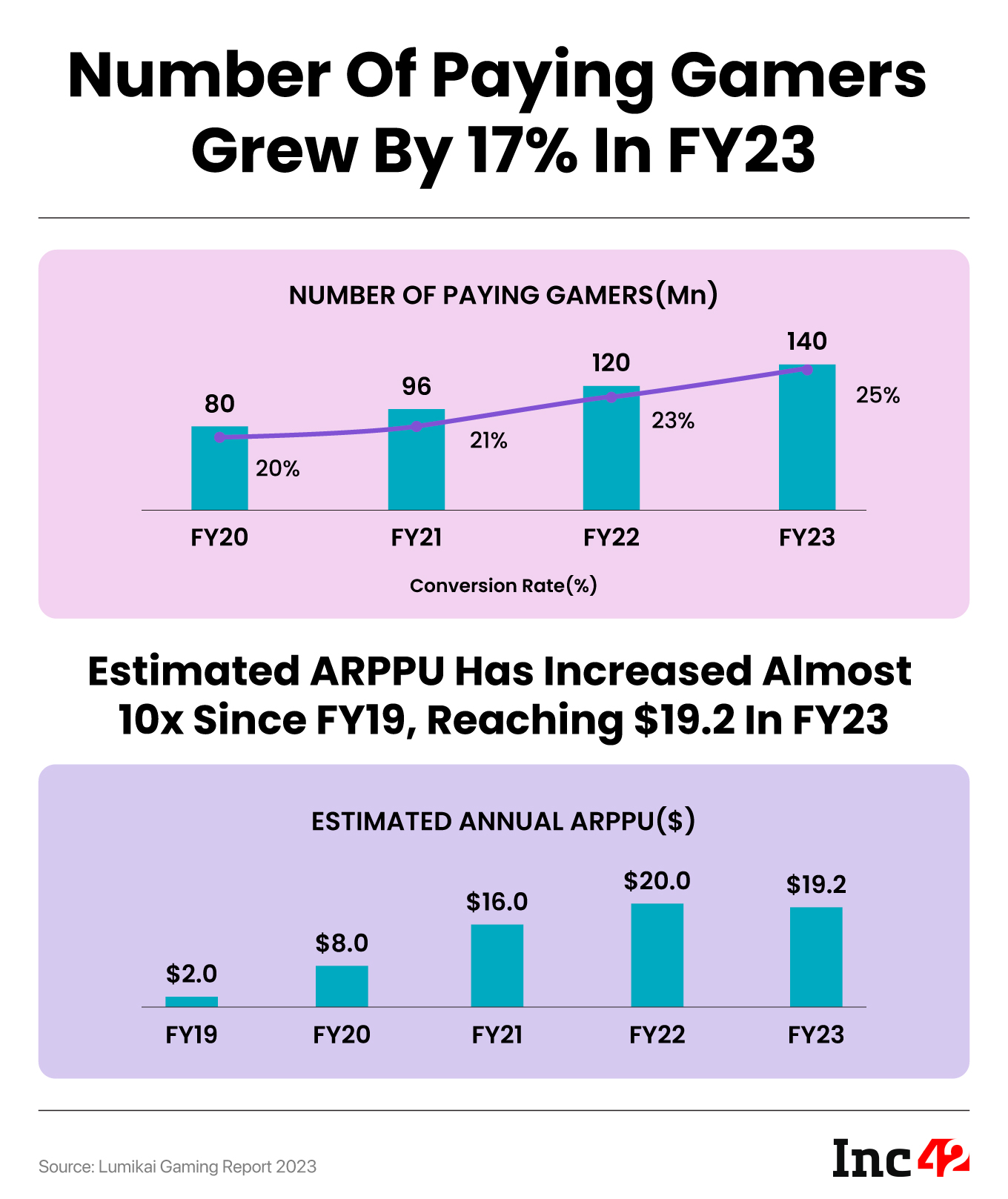
Given these headwinds and the consolidation within the RMG space, many investors are now turning their attention to India’s game development startups as a segue from fantasy gaming.
The Many Shades Of Game Development
When we talk about game development, it must be noted that this is not an unexplored space by any means, particularly when it comes to casual mobile games.
The likes of WinZO, MPL, Zupee, Nazara and others have developed a host of casual games over the years. These games typically leverage in-app purchases or ads for monetisation, but their scope is limited due to intense competition in this space globally, and high marketing costs associated with customer acquisition.
While casual games are the low-hanging fruits in the gaming space, there remains a vast untapped opportunity for game development when it comes to PC and console games, which have the biggest monetisation potential.
Dozens of startups including the likes of AET Fund-backed SuperGaming, MPL-owned Mayhem Studios, Kalaari-backed Bombay Play, Lumikai-backed All Star Games, Studio Sirah, nCore Games, Outlier Games among others are looking to make the most of the game development opportunity with a mix of casual and mid-core games for mobile, as well as PC and console games.
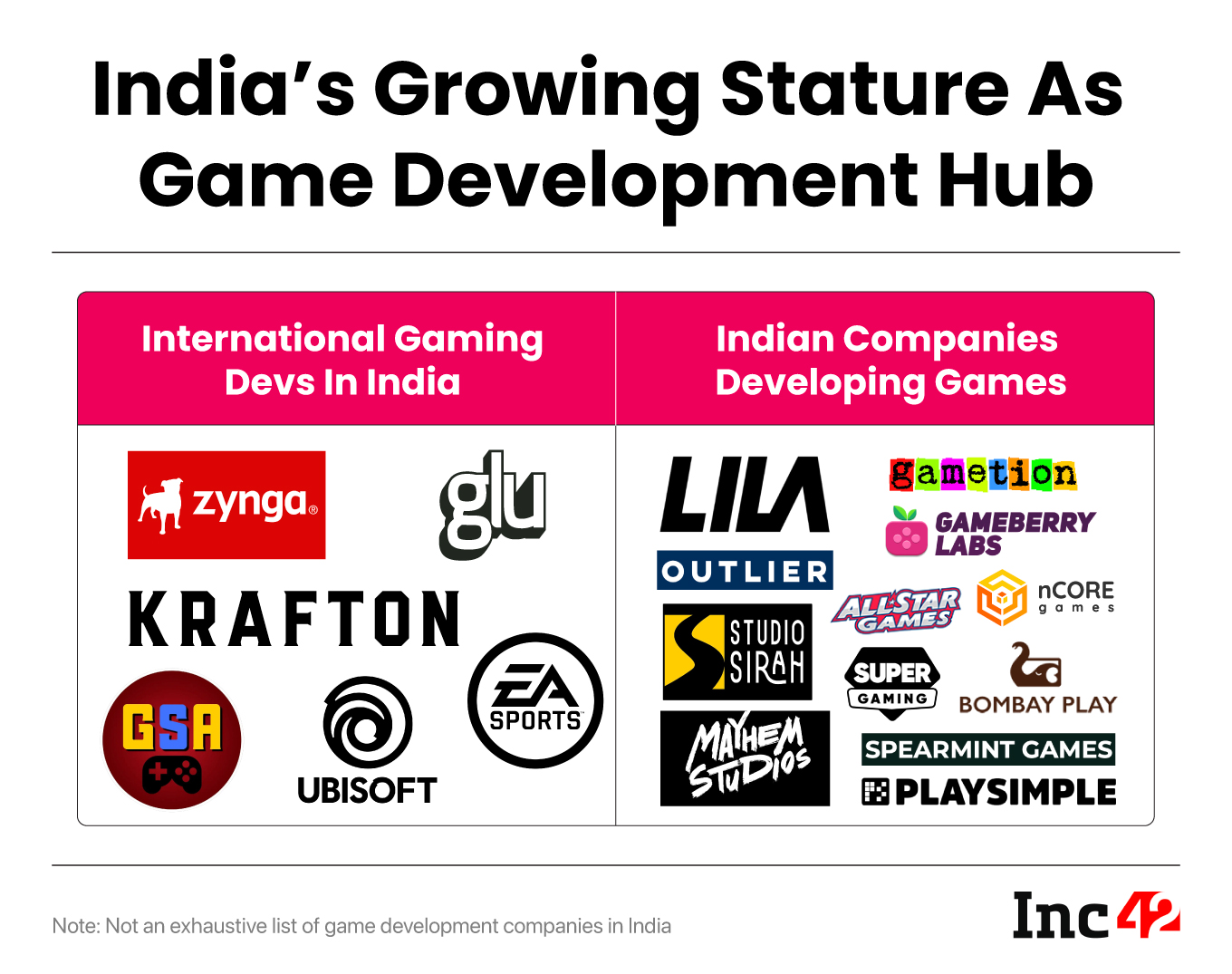
But founders in the game development industry and other stakeholders that we spoke to believe that even if the VC spotlight on game development grows, it will not solve the biggest problems for game development in India — talent and development costs.
Startups in this space are now pushing for improved policies from the government, looking to build and nurture talent in the Indian market and take the Indian gaming industry to the next level. And in many cases, they are forging ahead without any support from the VC ecosystem.
Are VCs Changing The Game?
“VCs don’t bet on long-term game development; they want short-term bets and that’s why the investment in casual games is higher, whereas serious game makers have no option but to bootstrap,” according to Harish Chengaiah, the founder of Outlier Games, a bootstrapped company based in Chennai.
He added that VC-funded startups developing mobile, PC or console games in India are often caught in a dilemma between pursuing their long-term vision and developing large-scale games, or releasing smaller games and products to generate revenue in the short term in line with investor expectations.
Developing large-scale games is time-consuming and involves six to seven years of work, whereas investors are more often than not looking for gains and exit options in the short term.
Echoing these views, Tejraj Parab, cofounder and CEO of Interactive Ice-Spice, believes that even if VC dollars come in, the expectation is to develop games within a year and launch them. On the other hand, a PC or console game takes anywhere between five and six years to develop.
IceSpice is part of the nCore Games group, which houses gaming studios such as Studio nCore and Dot9 Games. Cofounded by GoQii founder Vishal Gondal, the company has released two multiplayer mobile games FAU:G and Pro Cricket Mobile, with more titles expected this year.
Parab believes that most game development startups have no option but to take the slow route without VC backing similar to how gaming giants such as Activision, Blizzard, Epic Games and others evolved in the ‘80s and ‘90s in Silicon Valley.
How VCs See The India Game Dev Opportunity
Firms such as Lumikai or Centre Court Capital are squarely focussed on the gaming ecosystem, but such VCs are a rare breed in India, founders told us. Even if other VCs back gaming startups, it’s not a core focus area for them and therefore partners or fund managers may lack the nuance or patience needed for this space.
“The Indian market needs VCs that are patient when it comes to monetisation in gaming beyond real money gaming. Investors know that the games which have real revenue potential take time to be developed, but they are not willing to back these long-term bets,” added a third founder, whose gaming startup is backed by Kalaari Capital.
Instead, the VC expectation from startups is to follow the beaten path of a casual gaming platform like MPL or a fantasy game like Dream11 because these are working and there’s room for growth.
Now with the souring of the mood around real money gaming, many VCs are wondering whether they should invest in the game development space, where there’s not much precedent of success in India and where timelines for returns are typically longer than other sectors.
“Most Indian VCs will back models that have a monetisation precedent or enough of a TAM from a monetisation potential, but so far no Indian game development studio has shown the capacity to unlock this potential even though there exists a big audience for these games as we know,” explains one Mumbai-based early-stage investor, who has backed some platforms that cater to the gaming community.
It’s important to understand that casual games that typically are developed in a year or two can be an effective segue for monetisation for larger game studios as well, but most startups cannot afford to juggle multiple gaming products in this manner.
Even if VCs back game development studios in a big way, entrepreneurs in this space believe that the bigger problem is the lack of talent in this regard and the high operating costs for game development, which is as much about hardware as it is about resources.
Where’s The Talent?
“Game development is often equated with software development, but in reality, the two could not be further apart. Game development is not about a lone programmer hacking away, but about teamwork and excelling at individual roles,” Outlier Games’ Chengaiah added.
The term ‘game development’ comprises at least six different roles, Chengaiah clarified, and it’s not just about having one particular skill set or knowhow of just one aspect.
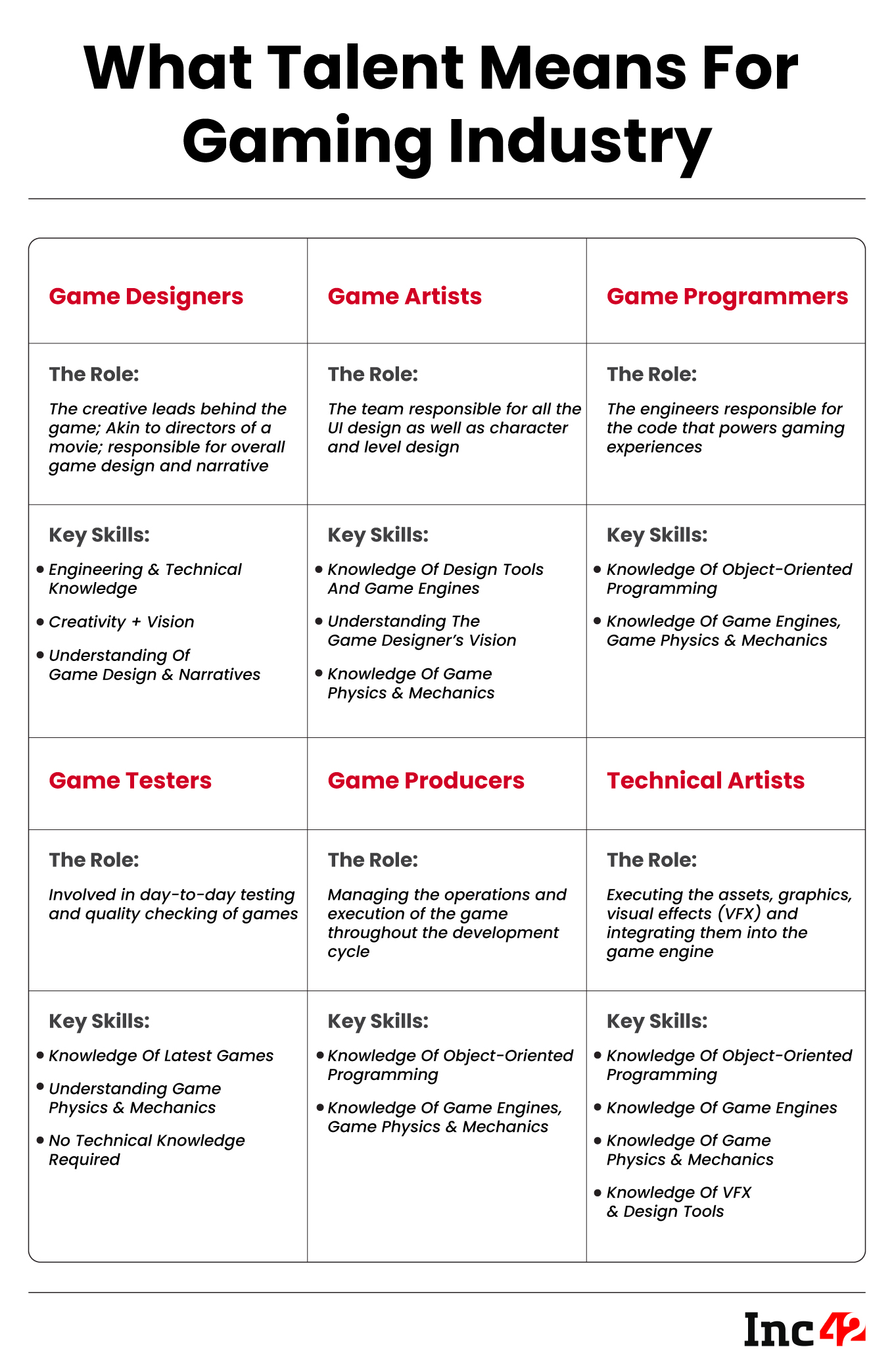
The primary problem when it comes to talent is that engineers and designers that are joining the workforce do not prioritise the skills or the design and programming knowhow for game development.
“There is a certain stigma when it comes to gaming; that it is meant for kids or that it is not serious money. Even in my family, I have to convince people about the scope of game development,” adds Ice-Spice’s Parab.
Continuity of talent is a major issue. Even if those fresh out of college might take up a role in a game development company, retaining this talent is hard because other tech companies can just throw money at the problem. And when it comes to those engineers and designers that are passionate about gaming, their primary destination is the US or Europe, where there’s a bigger market for their talent.
Founders such as Parab, Chengaiah or Supergaming’s Roby John say most dev studios poach talent from one another, especially in the weeks and days leading up to the launch of a game. Besides this, the lack of a continuous stream of talent tends to elongate the development cycles further.
“We have to do a demo, a vertical slice for publishers and then after that gets picked up, we can work on the full game. Just the demo itself takes 2-3 years at times and there’s no guarantee that it will work. The final game, after the publisher agreements, takes another 2-3 years. And the costs are only recovered in the second or third year of sales, and only when the game is a success,” Chengaiah said, adding that it’s no wonder that some of the biggest names in the gaming industry, even in the US, have had to grow bootstrapped in their first few years.
And that’s for a relatively short game that has 1 hour to 10 hours of gameplay. For longer games and larger game worlds, one can easily expect more than five years for the development to be close to completion.
Game development in other words is for patient investors, and founders are finding that not many VCs or funds understand this nuance. And even when startups raise funding at the early stage, it’s not enough to support development throughout this long lifecycle.
Chengaiah added that even if engineers or designers choose to make a career in gaming, they will need to add ancillary skills that are critical in this space. The founder of Outlier Games, for instance, teaches a game design and narrative writing workshop that’s specifically geared for game development or to create game designers.
Chengaiah is also the cofounder of Gamer2Maker, a game development edtech and upskilling platform, which brings together industry experts to nurture the next generation of game designers and developers. These efforts take many years to fructify, and only in 10 or 15 years will India have enough of a heritage in game development to actually make the most of it.
There’s some optimism that the government’s focus on animation and the VFX industry as a revenue generator will lift the tide for gaming startups, but so far the execution or implementation of policy has been slow. “Colleges are slow and outdated. My college which offered a gaming course in 2014 or 2015 has not updated its syllabus in nearly a decade,” Chengaiah bemoaned.
He added that no one expects an Indian gaming studio to make the next big AAA PC or console game right now, but that should be the goal for the next decade.
The High Cost Of Gaming
Common sense dictates that game development like most other tech businesses has eased due to the rise of tech tools and engines that do most of the heavy lifting.
Today, ChatGPT and generative AI tools might be able to develop a rudimentary game without any coder, but to make an engaging high-quality game for the global gamer audience involves multiple years of development, testing across hardware bases and development kits, utilising advancements in gaming engine and VFX and adapting to the changing sociopolitical landscape.
Creating a game is not unlike making a feature-length film, and indeed, in many cases, it’s a lot more complicated. Interactive Ice Spice’s Parab believes that it’s not just talent that’s expensive but also the resources that the talent will need to propel game development.
Most entry-level game designers and developers work on low pay as the cost structures are not favourable relative to enterprise tech or IT services. They often moonlight across many gaming companies to plug the income gap.
Given this, if a startup is not able to provide its talent with the right resources, they are very unlikely to get the best work out of them. Resources, in this case, means hardware development kits for consoles and gaming platforms, software licences for graphics, VFX and game engine work, direct hardware costs related to graphics processing units (GPUs) and high-end chipsets and a lot more.
Given the global semiconductor shortage, GPUs and CPUs have become costlier and excise duties related to importing them is prohibitive for bootstrapped game development startups. Even something like the electricity cost can hamper the prospects of a startup, so state governments need to be proactive about offering subsidies for such startups that often create long-term value and IPs.
These are areas where homegrown game development startups and studios feel they have a disadvantage. Not only are global development giants able to meet these costs more easily, but they are also able to corner the best talent from India and extend their lead in the market.
This is a catch-22 situation for game development studios and startups in India. Chengaiah and Parab believe that more than 40 companies are working in the studio space in India, and most of them are new companies with an average age of roughly four or five years.
This is the new long-term value and IP being created in India, which needs to be protected as it can have a multigenerational impact on the economy similar to the video game industry in the US.




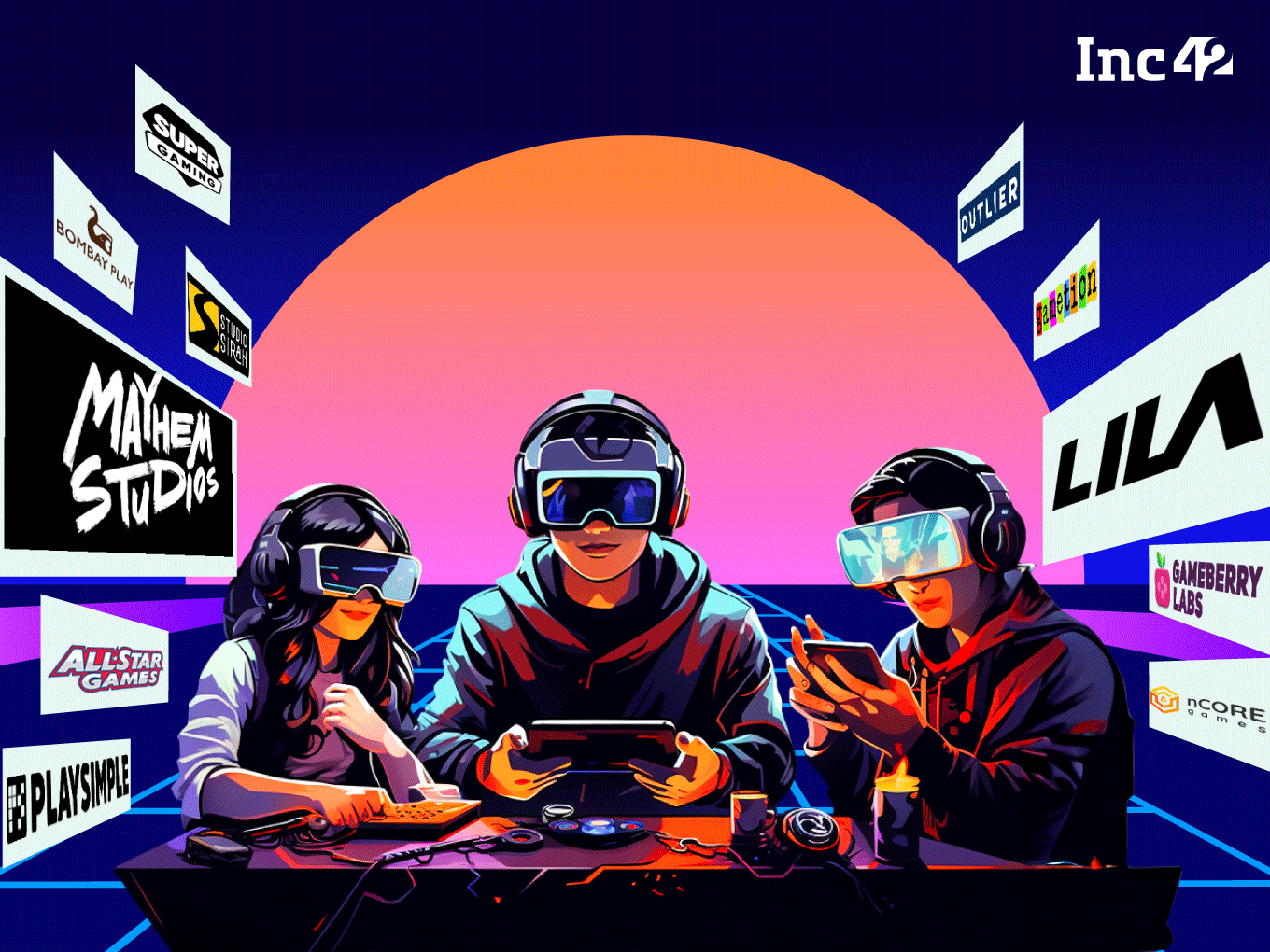




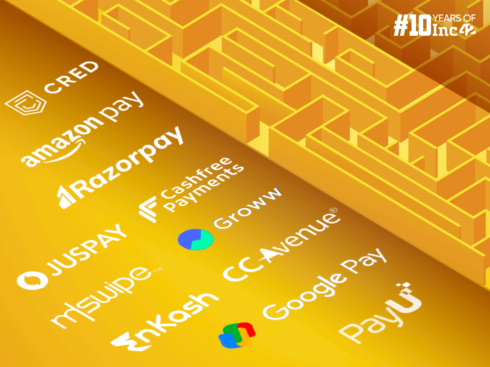
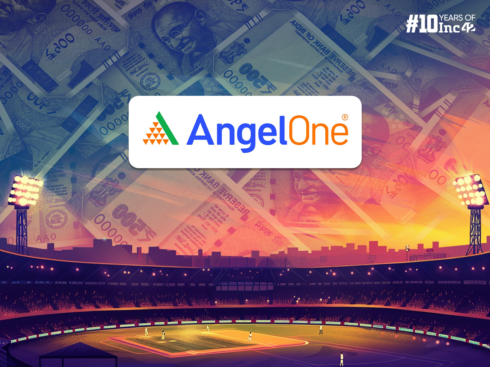




















 Ad-lite browsing experience
Ad-lite browsing experience